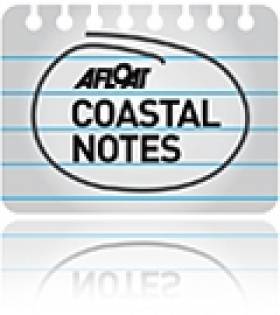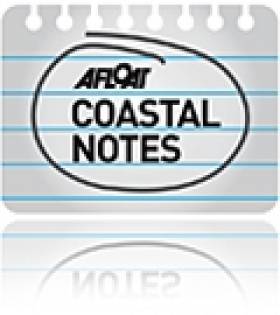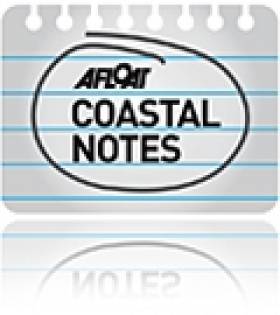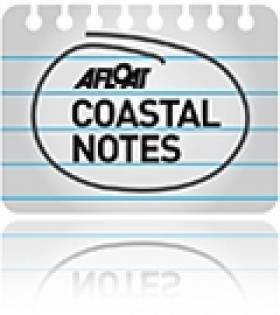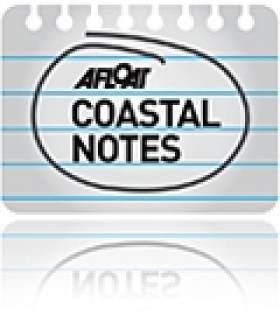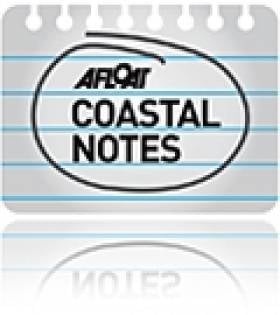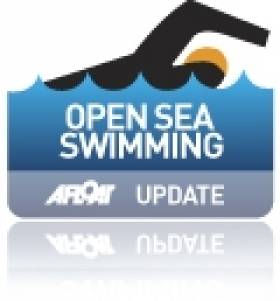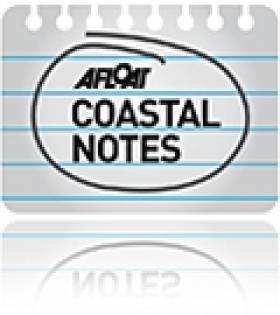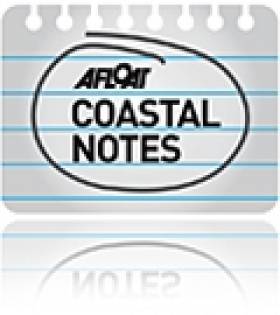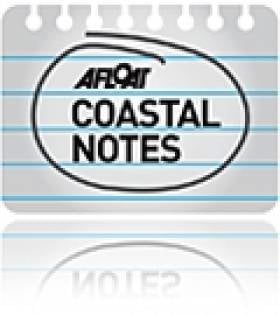Displaying items by tag: Coastal Notes
Clean Coasts Week Kicks Off For 2014
#CoastalNotes - As previously reported on Afloat.ie, Coca-Cola Clean Coasts Week 2014 gets underway today (Friday 9 May) with events for volunteers running throughout the island of Ireland till Sunday 18 May.
Apart from the more than 100 beach clean-ups around the coastline - details of which you can find HERE - there will also be a number of 'Coastal Celebration' events, starting tomorrow 10 May with European Clean Up Day and concluding on 18 May with a morning of whale and dolphin watching off Slea Head in Co Kerry.
The Clean Coasts Week website has much more HERE.
97% Of Ireland's Bathing Spots Rated Fit For A Dip
#CoastalNotes - The vast majority of Irish beaches are fit for bathing, according to the latest figures from the Environmental Protection Agency (EPA).
But as The Irish Times reports, any bathing spots that fail to meet the EU's minimum requirements in future will be closed for an entire season.
Of the 135 bathing places assessed by the EPA over the past 12 months, just four were rated as 'poor' quality.
Two of these were in Co Galway - Ballyloughane in Galway city, which experienced two pollution incidents; and Clifden, which "continues to be subject to episodic pollution" after it was identified among 40 towns nationwide still discharging raw sewage, though work is ongoing to upgrade the local treatment plant.
Some 114 bathing spots were rated 'good', and would have been rated higher if not for low but persistent bacterial levels in some East Coast waters.
Nationwide, the EPA's verdict is that better wastewater management practices have resulted in improving standards, maintaining Ireland's position as "one of the best countries in northern Europe" for water quality.
The Irish Times has much more on the story HERE.
An Taisce Calls for Coastal Clean Up
#cleancoasts – A call for volunteers to join Ireland's largest coastal clean-up and ensure Ireland's beaches are in ship shape was made today by An Taisce's Clean Coasts programme. That call was echoed by rugby legend Shane Byrne, Managing Director of AWD Waste Solutions Ltd who lined out at the launch of Coca-Cola Clean Coasts Week. Clean Coasts Week 2014 takes place from May 9th to May 18th and members of the public are invited to jump on board to make it the biggest yet.
Speaking at the launch Annabel FitzGerald, Coastal Programmes Manager, An Taisce said: "An Taisce's Clean Coasts programme organises hundreds of clean-ups mobilising thousands of volunteers who remove considerable quantities of marine litter from Ireland's environment. Raising public awareness is incredibly important when it comes to reducing marine litter and Clean Coasts' initiatives such as Coca-Cola Clean Coasts Week and #2minutebeachcleans are excellent for public participation and creating a sense of environmental responsibility. We are on course to make Clean Coasts Week 2014 Ireland's largest coastal clean-up event ever with 100 coastal clean-ups already registered." She added, "We are delighted to be working with the European Environment Agency this year and ask that all our Clean Coasts groups use the Marine LitterWatch app to record what they collect".
Clean Coasts Week was launched at Portmarnock Beach in Dublin today by Minister Fergus O'Dowd TD Minister of State at the Department of Environment, Community & Local Government. Speaking at the launch Minister O'Dowd said, "Ireland is famous internationally for its beautiful and scenic coastline, which supports rich ecosystems and vibrant economic activity. It is enjoyed by both visitors and locals alike. Tourism initiatives such as the Wild Atlantic Way plan to highlight the unique beauty of this natural asset. The damage done by this winter's storms, however, highlights its vulnerability. I would like to commend all who participate in this year's Clean Coasts week as it is such an important and worthwhile endeavor to protect and enhance such a valuable resource for the current and future generations."
Speaking at the launch, Erica Roseingrave, Public Affairs & Communications Manager, Coca-Cola Hellenic Ireland said, "The many clean-up events that take place during Coca-Cola Clean Coasts Week greatly benefit not only the local environment but also communities in which they take place. Clean-ups form a fantastic opportunity for thousands of volunteers to get out, be active and enjoy some fresh air and at the same time get to know their neighbours and make new friends. This social dimension of the Clean Coasts programme is one of its broader benefits and one of the reasons the groups are growing all the time. It's really positive and we're delighted to be part of it."
What's new during Coca-Cola Clean Coasts Week 2014?
1. The Marine LitterWatch App – Clean Coasts and the European Environment Agency
Marine litter is recognised as a growing pressure on coastal and marine environments. It has cross border impacts on wildlife and habitats as well as on human activities and health. It is a societal problem that needs our engagement. Reflecting on the need to fill data gaps as well as the aims of involving citizens in environmental issues such as marine litter, the European Environment Agency has developed the Marine LitterWatch app. Clean Coasts will be asking those who participate in Coca-Cola Clean Coasts Week to download the app and record what they collect. Each clean-up will have a unique code to make using the app easier.
2. Let's Clean Up Europe Day - May 10th
The Environmental Education Unit of An Taisce is the coordinator for Let's Clean Up Europe Day. Marine litter is entirely due to human activity, and therefore can and has to be controlled by human management. However, one community, one NGO or one country acting in isolation will not be the answer. The problem of marine litter should be addressed collectively across national boundaries and on May 10th Clean Coasts are delighted to be promoting Let's Clean Up Europe Day.
3. Beat the Microbead Day – May 16th
Clean Coasts will be launching their Beat the Microbead awareness raising initiative on May 16th. Microbeads are tiny particles of plastic are ingredients in thousands of personal care products sold around the world. These microbeads, hardly visible to the naked eye, flow straight from the bathroom drain into the sewage system. Wastewater treatment plants are not designed to filter out microbeads and so they end up in our oceans. Sea creatures absorb or eat microbeads. These microbeads are passed along the marine food chain. Since humans are ultimately at the top of this food chain, it is likely that we are also absorbing microbeads from the food we eat. Microbeads are not biodegradable and once they enter the marine environment, they are impossible to remove. www.beatthemicrobead.org
4. National #2minutebeachclean Day – May 17th
Clean Coasts are delighted to be holding Ireland's first every National #2minutebeachclean day as part of Coca-Cola Clean Coasts Week. Our aim is to engage as many people as possible in this BIG IMPACT initiative. On May 17th we are asking everyone who goes to the beach whether it's for a surf, swim or walk to do their very own #2minutebeachclean. Take a snap of the litter collected and post your snap on instagram/twitter/facebook with the tags @cleancoasts #2minutebeachclean. It's as easy as that and be in with a chance to win a Clean Coasts hoodie!
5. Marine Litter – A Work of Art!
Pick up a piece of marine litter from Cork Harbour and have it included in an international work of art! This event is organised by Clean Coasts and Marlisco Ireland in collaboration with international artist Mandy Barker to highlight the environmental issue of marine litter. During Clean Coasts week (9th- 18th May) there will be a series of beach clean-ups organised around the Cork Harbour area. During these beach cleans, volunteers will be asked to find a piece of litter that they would like included in a series of contemporary photographic art works created by international artist Mandy Barker. Mandy's pervious work has been exhibited worldwide and has featured in Time magazine. Mandy is undertaking a residency with the Sirius Art Centre in Cobh, County Cork during May. She will produce a series of work highlighting the marine litter issue and your litter item could be a part of her message!
To register a clean-up or find out more about Clean Coasts coastal celebration events please visit www.cleancoastsweek.ie
More Treasures Unearthed In Atlantic Storm Aftermath
#CoastalNotes - The extreme Atlantic storms of the first weeks of this year have proved a boon for archaeologists and other heritage enthusiasts on the western coastline, from the exposing of the wreck of a century-old schooner to the remains of Neolithic graves and the traces of an ancient 'drowned' forest.
And as The Irish Times reports, the aftermath of that serve weather is continuing to reveal more artefacts from Ireland's past, such as a forgotten harbour from the medieval period, early Christian burial sites and tools from the Mesolitic era.
Meanwhile, the drowned forest discovered on the northern shore of Galway Bay is providing evidence of what can happen when our planet experiences climate change, according to a local geology academic.
“That forest drowned because of weather,” says Prof Michael Williams of NUI Galway. “It was flourishing 5,000 years ago and then the climate in the north Atlantic changed. It became cooler and wetter, and the sea level began to rise."
Even so, Prof Williams doesn't deny the effects of the human footprint on climate change today, but warns that regardless of human action, future generations must prepare for rising seas over the next tens of thousands of years.
The Irish Times has more on the story HERE.
Trump Versus Snail In Legal Tussle Over Doonbeg Golf Resort
#CoastalNotes - Donald Trump is moving to throw the book at Clare County Council in a brouhaha over unauthorised coastal defence works and concerns over the habitat of an endangered species of snail at his recently purchased Doonbeg Lodge golf resort.
The Irish Independent reports that the American property tycoon, who purchased the resort in February, sent in lorry-loads of rock armour to shore up the coastline and prevent further damage to the links course caused by the series of severe Atlantic storms earlier this year.
But the council served an enforcement notice against the works as planning permission had not been sought for the area, which is home to the protected narrow-mouth whorl snail, a tiny mollusc that has survived since the Ice Age.
The Irish Examiner has more on the story HERE.
#GoWild - Mayo and Cork are dominating the public's choices in The Irish Times' new competition to find the Best Place to Go Wild Ireland.
Nominations are open HERE, and some of the many submissions already received sing the praises of cycling on quiet West Cork islands, swimming in secret 'blue lagoons' and spotting sea eagles, or exploring the rugged sea cliffs and storm beaches of remove coastal Donegal.
If you're in need of some inspiration for your own nomination, check out these breathtaking aerial images of Sligo's coastline as captured by the Irish Air Corps, courtesy of TheJournal.ie.
'Swim For Pádraig' Group Races Round Ireland's Coastal Counties
#Swimming - Some 50 friends of a young German-Irish man in a coma since a road accident in the US last year are this weekend racing to swim all 17 Irish coastal counties over 38 hours for his recovery, as TheJournal.ie reports.
The 'Swim for Pádraig' was organised to raise funds for the care of popular 23-year-old Pádraig Schaler, who's currently in hospital in Germany after he was knocked off his bicycle in Cape Cod last summer while on a J1 working holiday.
Starting yesterday, the group aimed to pay tribute to their friend's swimming skills - and passion for the Irish language - by taking to the open water in every Irish coastal county.
And as of yesterday they had raised more than €22,000 for his treatment.
TheJournal.ie has much more on the story HERE.
New Coastal Greenway Announced For Ring Of Kerry
#CoastalNotes - Public Transport Minister Alan Kelly has announced the development of a major new and world-class greenway as part of a national €11 million funding for cycling infrastructure.
The centrepiece of the funding will go towards construction of one of the world’s most dramatically scenic greenways – running along an old railway line, over viaducts through mountainous tunnels overlooking the Atlantic Ocean and Ring of Kerry.
Minister Kelly has allocated €3.4 million which will go towards construction of 26km of greenway from Glenbeigh to Cahirciveen along the old Great Southern Railway - tying in with the new Wild Atlantic Way scheme that recently received additional funding.
The minister predicts this will bring cycling tourists and visitors from all over the world to the Ring of Kerry, contributing in the region of 80 jobs between construction and increased visitor numbers.
His department says the Glenbeigh-to-Cahirciveen greenway "will open up the outstanding natural beauty of the coastline between these two towns offering an exceptional and unique visitor attraction in the southwest."
Minister Kelly himself commented: “The natural beauty combined with the history of the old railway tunnels and the viaduct will make this one of the most beautiful cycling holiday destinations in the world."
He added: “I see many families, guests, adventurers, casual cyclists and all manner of people making use of this greenway. It will be constructed over the next two years and follows our experience of the Great Western Greenway in Mayo.
"An economic assessment carried out on the Mayo project estimated that about 40 jobs were created, with another 50 retained in the local economy as a result of investing in the greenway. I expect similar progress to happen in Kerry.”
The Ring of Kerry Greenway is one of three projects awarded funding under the Government’s National Cycle Network programme. A further greenway will also be developed in Co Waterford, running from Clonea along the coast to Durrow.
Local authorities submitted 38 applications to the Department of Transport, Tourism and Sport. Separately, nine towns will receive investment to improve the cycling infrastructure within their towns.
Some €6.5 million will be allocated across nine towns as part of the Active Travel Town’s programme. The programme is a multi-annual funding support programme to support the strategic development of walking and cycling in towns outside the Greater Dublin Area. This funding will enable the delivery of local cycling and walking strategies, including new cycle lanes, provision of walkways and behavioural change initiatives in local schools and workplaces to encourage people to switch their transport modes.
Funding under both the Active Travel Towns and National Cycle Network programmes will, according to the department, "enhance both the experience and attractiveness of walking and cycling across the country and brings to €25m the investment made by this Government as part of our agreed commitment to invest €65m in sustainable transport agenda to 2016."
More Funding Announced For 'Wild Atlantic Way'
#WildAtlanticWay - TheJournal.ie reports that an additional €1.4 million in State funding will be winging its way to the new Wild Atlantic Way scheme.
Earlier this year Kinsale Yacht Club was announced as the starting point of the 2.500km coastal tourism route that was first launched almost a year ago.
Presented to 300 top overseas tour operators attending Meitheal 2013 - Ireland’s largest tourism trade fair - by Minister of State for Tourism Michael Ring and Fáilte Ireland, the ambitious project constitutes Ireland’s first long-distance driving route winding from Cork to the Inishowen Peninsula in Donegal.
The latest funding injection will provide for the completion of the Galway Greenway walking and cycling trail - itself a phase of a long-term scheme to connect the City of the Tribes to the capital along the route of the Royal Canal.
Downpatrick Head in Mayo will also receive funds for a visitor centre connected to its famous blowhole Poll na Seantainne. And Kinsale will get money to help restore the Signal Tower at the Old Head of Kinsale.
TheJournal.ie has more on the story HERE.
#CoastalNotes - An animal welfare officer has described as "planned and sinister" the dumping of a number of horse and cattle carcasses at the foot of the Baltard Cliffs in Doonbeg, Co Clare this week.
As The Irish Times reports, Frankie Coote of Clare ISPCA found "nine horses, four cattle and three calves together at the bottom of the cliffs" after a tip-off from a member of the public on Monday 31 March.
"Their ears had been cut off to remove the tags. This was planned. Whoever did it, it took quite a lot of work," he added.
In addition, an injured horse found high above the scene near the cliff edge had to be put down.
It's believed that the carcasses were thrown from the cliff top some 300 feet above, and have been decomposing at the coastal site for more than two months.
The ISPCA is working in conjunction with Kilrush Garda Clare County Council and the Department of Agriculture to investigate the incident. The Irish Times has much more on the story HERE.



























